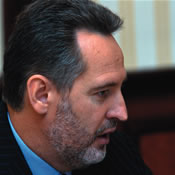
The Gazprom-Hungarian Gas Scam
Publication: Eurasia Daily Monitor Volume: 6 Issue: 126
By:

A burst of sunshine has finally been shed on the little known story of how a once obscure Ukrainian entrepreneur, Dmytro Firtash, suspected of links to Russian organized crime, and his unknown partners in a Cypriot holding company named Mabofi Holdings, established Emfesz KFT, a Hungarian gas company in 2003 and how the Russian state owned gas monopoly Gazprom gladly accommodated the success of this dubious enterprise. Emfesz managed within a few years to capture 20 percent of the Hungarian domestic gas market through its relationship with the Swiss-based company RosUkrEnergo (RUE). On June 23 the Russian newspaper Vedomosti published a revealing account of the dubious and possibly illegal arrangements which took place between RUE and Emfesz by Irina Reznik, the newspaper’s leading expert on Gazprom and its opaque operations.
Reznik interviewed Istvan Goczi, the CEO of Emfesz, who sold Emfesz to an unknown shell company based in Zug, Switzerland named RosGas AG for $1.00 earlier this month. RosGas’s listed address is located in the headquarters of a telecommunications company, Connect Phone Gmbh in Zug. However, according to the U.K. based NGO Global Witness no one at Connect Phone has ever heard of RosGas AG.
According to Goczi, RUE, the Swiss-based gas intermediary company which is 50 percent owned by Gazprom and 50 percent by Firtash and his partner, Ukrainian banker Ivan Fursin, extended Emfesz credits for gas purchases and did not require Emfesz to repay RUE monthly, but on an annual basis. Firtash, in turn, used his annual dividends from RUE, in 2007 some $360 million, to pay for this gas and transferred the profits from Emfesz to Mabofi. In other words, Firtash was paying his bill to RUE with money earned by RUE of which he owned 45 percent. Furthermore, Emfesz and RUE had signed a gas purchase contract till 2015 contingent on this arrangement. Gazprom’s representative on the board of RUE, the Deputy CEO of Gazprom and the head of Gazprom Export Alexander Medvedev, apparently not only approved this deal, but provided guidance on how it should be structured, in order to avoid any legal complications. When journalists from Vedomosti attempted to ask Alexander Medvedev about this matter on June 24 they were prevented from talking to him by security guards (www.vedomosti.ru, June 24).
In his interview Goczi stated that on July 17, 2008, Emfesz opened a credit line for $439 million with Firtash’s Mabofi which is due to expire on December 31, 2010. The guarantees on this credit line were Firtash’s future dividends from RUE. However, in January 2009, RUE was removed from its role as the middleman in the Ukrainian-Turkmen gas trade and the company was unable to supply Emfesz with gas. By March 2009 Firtash was being investigated for owing Gazprom $1.5 billion (www.pravda.com.ua, June 25).
"The main question today is to resolve the debt owed by the company (Emfesz) to its stock holders. I am unable to say what can be done to solve this debt," Alexander Medvedev stated at his press conference on June 24 (www.vedomosti.ru, June 24). Medvedev however, was largely responsible for the workings of RUE and certainly knew and approved of the scheme which kept Firtash’s Hungarian Emfesz operation viable. Whether he personally benefited from the scheme is unknown.
The Kremlin immediately launched a concerted effort to blame Firtash for all the irregularities in RUE in what appears to be an effort to absolve Medvedev, Gazprom management and the Kremlin of any wrongdoings. But other facts point to a totally different scenario. In a private memorandum prepared in 2007, seen by a number of officials in the E.U. and U.S., and which is now in Jamestown’s possession, it states:
"In early September 2007, a meeting took place in Moscow between Mogilevich, an unnamed prominent Russian businessman, and Vladimir Nekrasov, an associate of Mogilevich and his organized crime gang… Mogilevich called the meeting in order to discuss the situation in RosUkrEnergo and specifically Dmytro Firtash, the owner of 45 percent of RosUkrEnergo. Mogilevich complained that Firtash had defrauded him and Gazprom to the sum of about $1 billion and it was time to get him out of the business. He stated that Firtash had stopped paying him his share of the profits and his intention was to take over Firtash’s Hungarian operation, Emfesz Kft …Mogilevich stated: ‘I am close to Putin and the Kremlin is very upset with Firtash and will move against him as well.’"
While the authenticity of this memo cannot be independently verified, the information it contains about Firtash owing Gazprom and Mogilevich $1 billion appears to be accurate.
Additional evidence of a cover-up was provided in an interview with the head of the Russian Auditing Chamber Sergey Stepashin, by the Ukrainian newspaper Ekonomichna Pravda on June 25. Earlier this year, the auditing chamber was ordered to conduct an extensive audit of RUE, which it finished on March 31 (www.pravda.com.ua, June 25).
Stepashin was asked: "How legal was the discontinuation of the contract between Gazprom and RUE in regard to gas deliveries to Europe?"
Stepashin: "Gazprom lost $1.5 billion dollars."
"How do you explain why gas from Ukraine was delivered to Hungary without any contract?"
Stepashin: "We did not look into the Hungarian case."
These contradictory and confusing explanations surrounding Gazprom’s role in supporting Firtash’s Emfesz Kft company indicate that the highest political leadership of Russia along with Gazprom management are most likely involved in covering up a scandal of major proportions. Why the Russian audit chamber did not examine RUE’s multi-million dollar deals with Emfesz is indeed a mystery wrapped inside an enigma.




